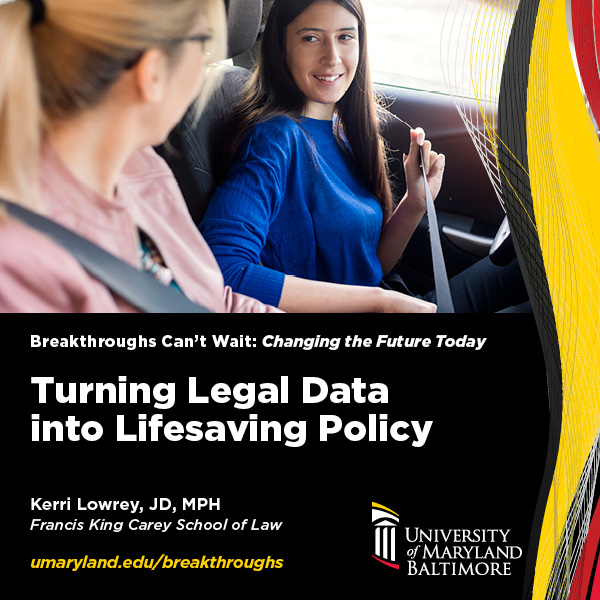Breakthroughs Can’t Wait: How Can We Keep Young Drivers — and Others — Safe?
July 30, 2025 UMB Office of Communications and Public Affairs
Kerri McGowan Lowrey, JD, MPH, of Maryland Carey Law partnered with the National Highway Traffic Safety Administration to examine how driver licensing laws impact teen safety.
At the University of Maryland, Baltimore (UMB), groundbreaking discoveries happen every day — transforming medicine, improving health, and shaping the future. From changing legal policy to pioneering treatments to cutting-edge scientific breakthroughs, UMB researchers are tackling real-world challenges and making a lasting impact on lives everywhere.
In our “Breakthroughs Can’t Wait: Changing the Future Today” series of videos, we will dive into inspiring stories of innovation from across UMB’s seven schools. See how scientists, doctors, and experts are addressing today’s most pressing issues — fueled by the critical support of government funding that drives progress forward.
Every year, thousands of young lives are lost on U.S. roads. For Kerri McGowan Lowrey, JD, MPH, that’s not just a statistic. It’s also a public health crisis that calls for data-driven solutions.
As deputy director of the Network for Public Health Law’s Eastern Region office at the University of Maryland Francis King Carey School of Law, Lowrey partnered with the National Highway Traffic Safety Administration to examine how driver licensing laws impact teen safety. Her team applied a method known as legal epidemiology — quantifying laws so researchers can evaluate their real-world effects on health and safety.
“This was an opportunity for us to get involved in a topic area that we found very compelling,” she said, adding that it also was an opportunity to apply legal epidemiology and explore law as both a remedy for and a cause of a public health problem.
Why does it matter? Because motor vehicle crashes remain the leading cause of death for people ages 15 to 20. In 2023 alone, more than 5,500 fatalities involved young drivers. That’s why Lowrey thinks it’s critical to evaluate whether public safety laws are truly working — and to improve them when they’re not.
“It’s arguably unethical to pass a law that’s supposed to protect people that actually doesn’t,” she said. “Policy evaluation research helps to ensure that the laws that we have in place to protect people are actually doing so — and in that way, we enhance public trust in our governance, and we enhance public trust in public health.”
In a new video Q&A, Lowrey shares how legal research can help save lives and why evidence-based policymaking is essential to protecting the next generation.
Read more about how University of Maryland, Baltimore researchers are tackling real-world challenges and making a lasting impact on lives everywhere.